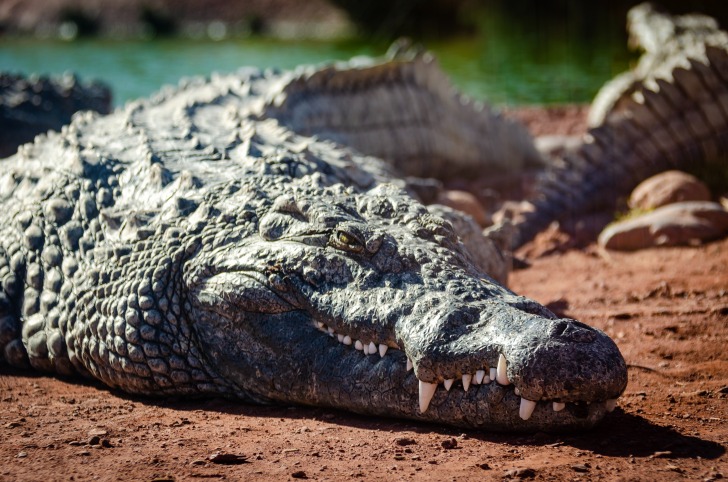While alligators are not a common sighting in upstate New York, that has not stopped some from releasing them into the wild anyway.
Since alligator sightings happen to take place more often than expected, the Cayuga Lake question is one that is well worth asking.
That’s why this guide is here to help anyone who needs to learn more.
Let’s take a closer look, shall we?
Contents
So… Are There Alligators in Cayuga Lake?
In a word, no.
There are multiple stories of alligators being found in bodies of water in upstate New York.
To the best of our knowledge, there are no such incidents taking place at Cayuga Lake.
Does that mean that you should just assume that all is well?
It depends on your personal risk tolerance, to be frank.
It’s akin to wondering if you are going to end up being struck by lightning.
They are not native to the region and when they do pop up, it is a big story every single time.
The average swimmer probably has nothing to worry about unless someone has decided to bring one to the area and set it loose.
This is something that does happen in upstate New York from time to time but is it enough to scare people out of swimming in the many lakes that the region has to offer?
Probably not.
Be sure to pay attention to the news, in case some joker has decided to set an alligator loose in the area but other than that?
It should be smooth sailing or swimming.
Cayuga Lake does not provide a hospitable environment for the alligator, which favors the American southeast.
Their winters are far easier for these animals to weather.
Placing them in a lake that freezes over come winter is not only foolish, but it is also inhumane.
These animals should not be removed from their natural habitats and transported to places that are not designed for them to live comfortably.
Cayuga Lake qualifies as this type of location.
Alligator Species in Cayuga Lake
As discussed, there is no need to worry about the specific alligator species in this lake because the area does not have the climate that they need in order to thrive.
The American alligator is found in the southeast, as their habitat typically begins in North Carolina and stretches out to the Rio Grande in Texas.
Unless someone removes an American alligator from one of these locations and transports it to upstate New York themselves, there is absolutely nothing to worry about.
These sorts of incidents are few and far between.

Is it Safe to Swim in Cayuga Lake?
The prospect of a hungry alligator is not something that the average Cayuga Lake visitor has to deal with but that does not mean that there are no dangers to speak of.
For the most, Cayuga Lake is safe to swim in but there is one major concern that warrants further discussion.
There are swimming and water contact advisories in place for the region that must be addressed before swimming is 100 percent safe.
Hazardous conditions present themselves in Cayuga Lake periodically because there are algal blooms that are harmful to swimmers.
The bacteria levels in Cayuga Lake will also be raised to a dangerous point and this is something that visitors and residents must remain cognizant of.
There is no scientific method that allows experts to predict when these types of events will take place, either.
That’s why the onus is on those who use the lake to remain up to date and take the proper precautions to protect themselves.
Fortunately, there are some precautions that can be taken.
For starters, it is imperative that the swimmer takes the time to monitor the waters themselves.
The algal blooms must be avoided at all costs.
When blooms are visible in the surface water, this is a sure sign to steer clear.
It is also in the best interests of the swimmer to avoid as much direct contact with the water as possible.
Do not swallow the water.
Keep your face and head out of the lake water, too.
This will significantly reduce your chances of swallowing harmful bacteria and organisms.
If the water is discolored and/or cloudy, this is a sure sign that it should be avoided.
Poisonous microorganisms are often found in waters of this nature.
Once you are done swimming for the day, be sure to wash your hands thoroughly, so you are not risking further exposure.
Interesting Alligator Facts in Cayuga Lake
While there are no alligators to be found in Cayuga Lake under normal circumstances, the state is home to all sorts of alligator-related stories and myths.
Some might believe that these stories are the product of upstate New Yorkers having a grand old time making up tall tales, but they are more believable than you might have realized.
In fact, one of the most compelling tales about New York state alligators takes place in New York City, as opposed to upstate.
In 1935, some local children were said to have found an alligator in the sewer while they were shoveling snow.
They are also said to have beaten the creature to death.
Of course, skeptics will say that newspapers were willing to print just about anything back then.
There was no picture, byline, or even a follow-up.
However, other newspapers wrote articles about the presence of the gator, which gives believers more to lean on.
The New York Times was responsible for the initial piece but there was another story in the New York Herald-Tribune.
This story differed a bit from the original, lending credence to the tale.
Back in the 1930s, alligator sightings in the metro area were actually not all that uncommon.
At the time, baby alligators could be purchased through the mail for the price of $1.50.
We suspect that many of these baby alligators were dumped into the sewer system once they outgrew their confines.
Others believe that the gators were escaping from boats.
Either way, it goes to show that New York has had more of these creatures present than you would have expected.
Perhaps one day upstate New York will also be home to one of these legends!

Alligators vs. Crocodiles
The lack of alligator presence in upstate New York has already been discussed at length.
This begs the obvious follow-up question: are there any crocodiles present in upstate New York?
This is simply not something that the average resident or visitor will have to worry about.
The only way that you are seeing a crocodile in upstate New York (and by extension, Cayuga Lake) is if you head to the zoo.
While the crocodile tends to be more aggressive than the average alligator, these are not concerns that most swimmers in the region are ever going to have to deal with.
3 Safety Tips for Swimming in Alligator Infested Waters
Cayuga Lake may not be known as a hotbed of alligator-related activity but that does not mean that you should not keep your head on a swivel anyway.
These tips will help any swimmer on the off chance that they happen to come across one of these reptiles.
1. Don’t Splash!
When an alligator hears splashing, they are only thinking about one thing.
They will advance towards the noise, in hopes of coming across a food source.
This leaves dogs and children especially susceptible and there is no reason to take these kinds of risks.
While the chances of encountering an alligator in Cayuga Lake are slim to none, splashing is not encouraged.
Even if they are at the water’s edge, splashes could end up attracting unwanted attention.
Alligators who are looking for a meal are not going to take the time to differentiate.
Splashing will lead them to believe that they have the opportunity to swoop in on injured prey.
2. Do Not Corner an Alligator
There is no reason to corner an alligator when you find them out on the water and it is not going to end well.
Those who corner alligators are going to make the animal feel as if they are being threatened.
A threatened alligator will not be asking questions, they are simply going to attack.
Alligators are not looking for humans to lunge at, contrary to popular belief.
In fact, these reptiles are often just as threatened by your presence as you are by theirs.
Let’s say that you see one sliding off the river banks and into the water.
In most instances, they are not going to head in your direction.
They are merely looking for a different, more peaceful location.
3. Maintain a Respectful Distance
Alligators may not wish to attack humans who happen to be swimming in their waters but that does not mean that you should be testing their patience.
They move in a slow and awkward manner, which can cause some to believe that they could swim faster than an alligator if the situation calls for it.
Nothing could be further from the truth.
They can move at surprising rates of speed, especially when they feel as if they are tracked.
It is not likely that an alligator will attempt to chase you through the water but it is not a risk that should be taken.
As a rule of thumb, if you are close enough to hear the alligator hiss, you have gone too far.
Summary
Alligators are not a major concern for Cayuga Lake swimmers but that does not mean that precautions should not be taken anyway.
Most of the precautions will be related to the potentially poisonous algal blooms and high levels of bacteria that are often present.
Since there is no way of predicting these blooms or the presence of harmful bacteria, swimmers are advised against swallowing the water or having it come into contact with their face or eyes.
Swimmers are also advised to wash their hands thoroughly as soon as their swimming has concluded for the day.
Frequently Asked Questions
How many people die each year from alligator attacks in Cayuga Lake?
The answer is zero.
Alligator sightings are very uncommon in the region and there are no recorded alligator attacks in or around Cayuga Lake.
Are there any other dangers to be aware of?
Cayuga Lake swimmers should certainly remain aware of the poisonous algal blooms and bacteria, as mentioned above.
Outside of these concerns, there is not much else for a swimmer to be concerned with if they decide to take a dip in Cayuga Lake.
How often are alligators found in this region?
While there are isolated incidents where alligators are found in the region, this is not really a day-to-day concern for the average upstate New York resident or visitor.
When these reptiles are located in the area, they are usually the product of sole actors, as opposed to a true migration.












In short, while alligators may not be a common sighting in upstate New York, it is still important to remain aware of potential risks and take necessary precautions when swimming in Cayuga Lake.